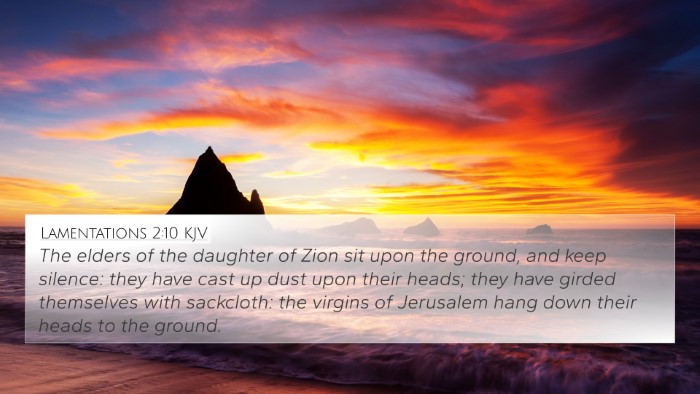Lamentations 3:28 - Understanding the Verse
The verse "It is good for a man that he bear the yoke in his youth." appears in Lamentations 3:28 and offers profound insights into the experience of suffering, resilience, and the character-building process through hardship. This verse, penned by the prophet Jeremiah amidst the backdrop of Jerusalem's destruction, is a powerful exhortation to embrace the challenges of youth, suggesting that enduring trials early in life can lead to growth and wisdom.
Contextual Overview
Lamentations is a collection of poetic laments reflecting on the destruction of Jerusalem and the suffering of its people. It is crucial to interpret Lamentations 3:28 in light of its context, as the surrounding verses discuss the nature of God’s mercy, discipline, and the hope that remains even in despair. Jeremiah, in this context, acknowledges suffering as a part of God's plan for personal development.
Commentary Insights
Drawing from the insights of renowned commentators:
-
Matthew Henry:
Henry emphasizes the importance of learning from adversity, arguing that early trials can nurture qualities such as patience and strength. The yoke is a metaphor for burdens, indicating that enduring challenges in youth prepares one for the responsibility of adulthood.
-
Albert Barnes:
Barnes describes the "yoke" as a symbol of discipline and correction. He notes that accepting this yoke early allows individuals to develop resilience and a sense of necessary humility. This submission to life's challenges can lead to spiritual growth and maturity.
-
Adam Clarke:
Clarke elaborates on the societal implications of this verse, positing that the foundational lessons learned through hardships can equip individuals for future challenges, allowing them to support others in their journeys. He stresses the transformative nature of early burdens.
Spiritual Themes
The spiritual themes encapsulated in Lamentations 3:28 resonate deeply throughout Scripture:
- The Value of Suffering: Biblical narratives are replete with examples of individuals who endured suffering and emerged refined (see Romans 5:3-5).
- God's Discipline: God's discipline as a form of love and guidance is mentioned in Hebrews 12:5-11, reinforcing the idea that trials help shape godly character.
- Hope in Despair: Even in the darkest moments, hope can prevail, as seen in Psalm 30:5, which states that joy comes in the morning.
Cross-References
Here are some Bible cross-references that relate to Lamentations 3:28, allowing for a deeper exploration of its themes:
- Jeremiah 29:11: God has plans for our welfare, emphasizing hope amidst trials.
- James 1:2-4: The joy of facing various trials as a means of growth.
- 2 Corinthians 4:17: Present sufferings lead to eternal glory, reinforcing the value of enduring hardship.
- 1 Peter 5:10: After suffering for a while, God perfects and strengthens us.
- Psalm 119:71: It is good for me that I have been afflicted, that I might learn Your statutes.
- Proverbs 3:11-12: The Lord’s discipline is an expression of His love.
- Romans 8:28: All things work together for good for those who love God.
Applications for Life
Understanding Lamentations 3:28 allows us to apply its teachings to our lives today:
- Embrace Challenges: Learning to view life's adversities as opportunities for growth can enhance resilience.
- Develop Patience: Just as a young individual bears a yoke, patience can be cultivated through trials.
- Seek God in Trials: Rooting oneself in faith during hardship can provide comfort and guidance.
Conclusions
Lamentations 3:28 offers profound insights into the necessity of enduring life's challenges, particularly in youth. Through the teachings of respected commentators, coupled with cross-references, we can see a robust theological framework that honors the process of growth through suffering.
This verse connects to a larger biblical discourse about discipline, hardship, and spiritual formation, making it a rich source for personal reflection and study. The exploration of this verse through a variety of scriptural lenses offers a holistic view that encourages individuals to embrace their personal journeys with courage and faith.






